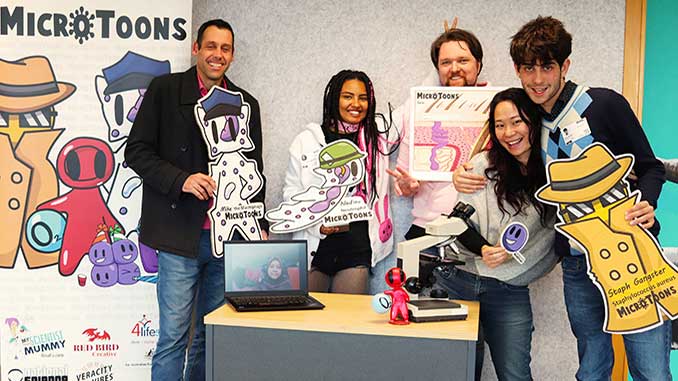 A project using fun animations created by and made inclusive for people with neurodiversity and disabilities has been awarded an $18,000 Inspiring Australia National Science Week Grant to help people with autism engage with science, technology and art.
A project using fun animations created by and made inclusive for people with neurodiversity and disabilities has been awarded an $18,000 Inspiring Australia National Science Week Grant to help people with autism engage with science, technology and art.
A collaboration between Edith Cowan University (ECU) academic Dr Rina Fu (or ‘Dr Rina’, as she’s affectionately known by many), animation studio Red Bird Creative and disability services provider 4lifeskills, the MicroToons project uses dialogue-free animated short stories to explain various aspects of biology, featuring characters such as blood cells and microbes.
It’s the project’s second federal National Science Week grant, with the first being used to create the multi-award-winning MicroToons: Pimple in 2021. It also caught the attention of Federal Minister for Early Education and Minister for Youth Dr Anne Aly, who requested a meeting with Dr Rina to discuss the project in depth.
Autistic and neurodiverse artists are involved throughout the creative process, from storyboarding, to the evolution of characters from pencil sketches to computer graphics and moving animations.
Dr Rina is a lecturer and unit co-ordinator of Applied Microbiology and Introduction to Haematology at ECU’s School of Medical and Health Sciences. Dr Rina, who has a brother with autism, said the aim for MicroToons was to show science, technology and art in a new light.
“People with autism can struggle to engage with science, technology, and art; but when they manage to, it can empower them,” said Dr Rina Fu. “For a lot of neurodiverse people, the stimulus which makes something enjoyable for the wider population can actually be stressful, overstimulating and a trigger point for anxiety and behavioural changes.”
“So, for MicroToons, we were careful with our colour scheme so it’s not fluoro, bright yellow on the screen, which research has shown can prove challenging for people with autism. There’s also no dialogue to make it accessible without the language barrier and it’s easily translatable to other languages.”
“Using cinematic sound effects and simple labels makes the complexity easily understandable for a wide audience. So, whatever your background, you’ll take something away from the MicroToons story,” she said.
The new grant will go towards the creation of a new story, MicroToons: Scab – which will be launched on Friday 25 August at an event including hands-on science activities which are inclusive of people with disabilities.
For more information, visit: www.ecu.edu.au for details.
Image: The MicroToons Team: (L-R): Aaron Welch (Red Bird Creative, Studio Director), Dafa Khairunnisa (Lead Artist, on the laptop), Tyla Harle-Winston (Artist, storyboard), Joseph Gardam (Animator, Lead Storyboard Artist), Dr Rina Fu (Project Lead, Story Writer, Artistic Director), Kai Jones (Animator) – photo by Callum Pilkington
